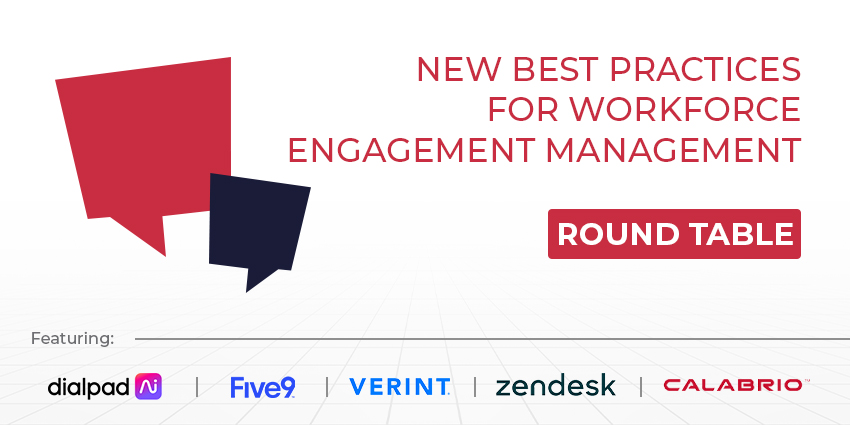Customer expectations and contact center technologies are continually evolving, making ongoing learning a must.
However, great coaching isn’t just about preparing agents to handle any customer service scenario.
Indeed, it’s also about improving engagement, bolstering retention, and – ultimately – enhancing broader business outcomes.
As such, here are some tips, activities, and tools business leaders can use to elevate their coaching strategies and empower the next generation of contact center agents.
Contact Center Coaching: Actionable Tips for Success
Get contact center coaching right, and agents become motivated, less stressed, and better at their jobs.
Get contact center coaching wrong, and agents feel like it’s just something else that they have to do. That can foster feelings of resentment.
The following tips will help contact center leaders devise a coaching strategy that does the former.
1. Take a Data-Driven Approach
Employees have varying strengths and weaknesses. The best way to provide employees with the support, knowledge, and skills they need – as an individual – is to dive into the data.
Those with an automated quality assurance (auto-QA) platform are best placed here, as they can monitor agent performance and sentiment across different contact reasons.
Nevertheless, just examining reports and analytics that offer insights into handling times, customer satisfaction scores, and schedule adherence leads to more impactful coaching.
After all, these metrics help to illuminate broader performance issues, which a contact center that only monitors a small percentage of agent calls could never track.
2. Personalize Every Coaching Experience
Adapting contact center coaching strategies to each agent’s specific strengths and weaknesses is a great start. But coaches can go further.
For instance, they can dashboard the individual’s progress against performance targets and consider adapting training resources for various learning styles.
Also, add color to the performance data. Allow agents to identify their own strengths and weaknesses so they can share thoughts on the best learning path.
3. Establish Clear Objectives for Each Coaching Session
Clear goals keep managers and agents aligned on expectations.
So, identify “SMART” objectives, determining precisely what needs to be improved and how results will be measured.
Moreover, adopt a structured coaching model for the best results. For instance, the “GROW” model follows the process of:
- Goal: Define the objectives to achieve.
- Reality: Assess the current situation and challenges.
- Options: Explore available coaching opportunities and activities.
- Will: Establish a commitment to specific action steps.
4. Blend Technical and Soft Skills into Contact Center Coaching
Regular technical training is crucial with new technologies like agentic AI, automation, and advanced analytics entering the contact center.
However, soft skills form the foundation of agent success.
So, when building contact center coaching programs, don’t overlook the importance of emotional intelligence, active listening, and communication skills.
Use metrics like customer satisfaction and the net promoter score (NPS) to gain insights into each agent’s relationship-building abilities.
Remember to consider time management and stress management skills for high-pressure roles.
5. Encourage Agent Accountability
Agents must buy into the coaching program if it’s to work well. So, beyond simply telling agents how their performance will be evaluated, invest in getting them involved in their own learning.
How? Perhaps by hosting regular meetings and check-ins to examine agents’ progress and updating coaching strategies based on feedback.
Also, promote collaborative problem-solving and recognize agents for their achievements rather than just sharing critical feedback.
6. Explore Real-Time Contact Center Coaching
Setting aside specific times in an agent’s schedule for advanced coaching and training programs can be helpful.
However, real-time coaching helps reinforce key learnings, as the supervisor can help them adopt new contact-handling processes.
While such side-by-side coaching is more tricky in a remote contact center, “whisper” tools built into contact center solutions can help supervisors provide instant feedback.
Additionally, AI-powered assistants are also extremely effective in delivering instant coaching insights without the need for a supervisor.
Contact Center Coaching: Engaging Activities
Contact center coaching experiences come in many different forms. Some revolve around one-on-one conversations between employees and coaches, while others feature gamified elements designed to motivate and increase employee morale.
Given that, here are some top coaching activities to try.
1. Conversation Simulations
From discussions about specific product technicalities to interactions with irate customers, contact center agents must be prepared for various types of tricky situations.
Simulations offer agents a proactive way to learn how to handle different interactions in a safe environment.
e-learning authoring tools can create interactive dialogue simulations. Meanwhile, some new AI assistants also promise to soon enable such simulations.
Agents can engage with these modules individually, receiving immediate feedback on their responses.
Alternatively, pair agents with a buddy to practice common types of conversations.
2. Customer Role-Playing Exercises
Role-playing allows agents to step into the customer’s shoes, fostering empathy and refining communication techniques.
Indeed, companies can pair up agents and assign one the role of the customer with a specific issue while the other acts as the agent.
After the interaction, conduct a debrief to discuss what went well and areas for improvement.
3. “Yes, and…” Storytelling
The “Yes, and…” contact center coaching activity is a practice in improvision, encouraging agents to build on each other’s ideas.
In a group setting, one agent starts a story with a single sentence. Each subsequent agent adds to the story, beginning their sentence with “Yes, and…”. This continues until the story reaches a natural conclusion.
This exercise fosters quick thinking and problem-solving while also encouraging agents to practice their active listening skills during conversations.
4. Customer Service Bingo
For agents who value gamification in their contact center coaching experience, the “Customer Service Bingo” activity combines learning with fun.
Create bingo cards populated with desirable customer service actions or phrases. As agents exhibit these behaviors during calls, they mark off the corresponding squares. Reward those who fill out the entire card.
This game motivates agents to actively apply best practices in their interactions, leading to improved service quality and new skill sets.
5. Call Center Olympics
Another competitive but collaborative activity for contact center coaching sessions, the call center Olympics, is designed to improve performance metrics.
Identify specific KPIs to improve, such as first call resolution (FCR) rates and quality scores.
From there, ask agents to compete over a specific period to achieve the best performance rates in these categories.
Recognize top performers with medals or certificates to boost motivation and encourage a healthy, competitive spirit.
Just be careful not to select metrics like average handling time (AHT) or schedule adherence, as it may drive negative agent behaviors.
6. Empathy Development Sessions
Empathy development sessions focus on building the emotional intelligence of contact center agents, so they can build stronger relationships with customers.
One way to approach this contact center coaching activity is to share real customer stories and feedback during team meetings before discussing that with agents.
Just be careful the story does not pick specifically on one agent or team of agents.
Alternatively, business leaders could ask agents to share their own experiences as customers, particularly focusing on situations when they felt frustration or anger.
7. The Taboo Communication Game
This game builds on a contact center agent’s communication skills. Provide agents with a list of words they can’t say during a customer service scenario, and ask them to practice explaining concepts without those words.
Words to exclude might include things like “no” or “can’t” – which encourage agents to be more positive during interactions. This improves vocabulary, adaptability, and an agent’s ability to convey crucial information in difficult scenarios.
Again, be careful with this. Don’t ban agents from using these words during real calls, as that may make contact handling tricky and drive up call durations.
Yet, the call center coaching activity can help agents perform better in particular scenarios, like when delivering bad news to a customer.
Contact Center Coaching: The Right Tools for the Job
Delivering continuous contact center coaching can be tricky, particularly when managers and supervisors have limited time to interact directly with agents.
Fortunately, many quality assurance (QA) platforms offer built-in coaching solutions.
Five excellent examples of these platforms include:
1. NICE
NICE Quality Management comes with numerous built-in tools for real-time and historical performance and monitoring, as well as contact center coaching.
Indeed, it offers a comprehensive approach to agent development by integrating AI-powered feedback into workflows.
As such, agents can access instant performance scores and suggestions from AI assistants for how to tackle complex challenges.
Plus, the platform’s Evaluation Summary enables quality management leaders to quickly identify personalized training opportunities.
2. Verint
Verint offers access to powerful tools for coaching, most recently via its specialized bot strategy.
For instance, it offers a CX/EX scoring bot that offers real-time insights into agent performance and a dedicated coaching bot for real-time assistance and personalized training.
Verint also offers out-of-the-box workflow automation solutions for scheduling, delivering, and tracking coaching sessions.
For each session, Verint surfaces quality monitoring evaluation scores and key performance indicators (KPIs), guiding the conversation.
Moreover, this integration ensures coaching directly ties to performance metrics, providing employees with clear guidance on skill enhancement.
3. Calabrio
Calabrio presents a “Performance Coaching” tool as an add-on to its Quality Management product. It empowers supervisors to collect insights from performance metrics and employee feedback.
In doing so, it builds personalized coaching experiences for all agents.
Calabrio’s evaluation forms also help businesses to rapidly identify opportunities for growth, while real-time monitoring and dashboards ensure companies can track the effectiveness of coaching sessions.
4. Scorebuddy
Scorebuddy offers an all-in-one solution for performance management that integrates with contact center platforms.
Like others, the provider uses QA data to identify development opportunities and deliver personalized training.
Yet, more interestingly, coaches can create custom training journeys for every employee, linking sessions to specific behaviors and interactions.
Plus, there are convenient built-in templates for coaching workflows to help organizations create standardized sessions faster.
5. evaluagent
evaluagent access to customizable AI scorecards for real-time feedback on every interaction, as well as dedicated coaching bots.
Professionals can take advantage of constant, personalized, and unbiased evaluations on every aspect of their performance and even experiment with gamified experiences.
Plus, supervisors can build coaching strategies based on predictive NPS score insights and CSAT reports.
Finally, the vendor combines QA, coaching, and conversational analytics to drive deeper performance insights.
Final Thoughts: Excellent Coaching Is More Critical Than Ever Before
As AI and automation mechanize more simple, transactional customer service queries, effective contact center coaching is more crucial than ever.
Companies can’t just train or onboard employees once. They need a comprehensive, dynamic process that can evolve alongside agent needs, business objectives, and customer expectations.
Taking a holistic approach to coaching, with the right tips, activities, and cutting-edge tools, ensures businesses can continue to thrive in the new age of customer service.







